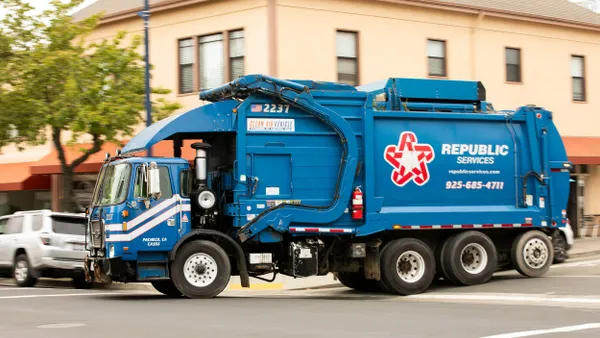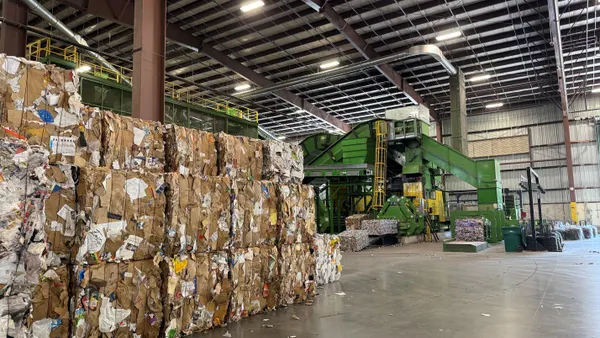2018 Earnings
| Revenue | $14.91B |
| Adjusted Net Income | $1.925B |
Q4 Earnings
| Revenue | $3.84B |
| YoY Change | 5.2%▲ |
| Adjusted Net Income | $531M |
Buoyed by a better-than-expected fourth quarter, its stock price reaching record highs, Waste Management is very happy.
"At this time last year, I was telling you that 2017 was arguably the best year we've seen. I'm pleased to report that 2018 results were even better," said CEO Jim Fish during the company's fourth quarter earnings call.
Operating EBITDA (described as the company's preferred metric) grew by more than 5% to $4.27 billion — "in spite of the strongest recycling headwinds we've seen in over a decade" — and organic revenue growth in the company's collection and disposal business was up 5.8% during Q4. All of these driving forces portend another seemingly profitable, and increasingly complex, year ahead.
Parallel Priorities
- Following its recent sustainability forum, Waste Management is talking more about alternatives for low-value plastics coming out of MRFs. Fish outlined his thinking in response to one analyst's question. "We really are looking at this as being an offensive move," he said. "Is there something we can invest in that produces really good returns, but also is able to handle some of these waste plastics out of the backend of the plant?"
- Recycling revenue increased by $18 million in Q4, but 2018 revenue of $1.293 billion was down YoY. According to Fish, the company still expects recycling to be a 2019 tailwind as operating costs stabilize and contamination fees bring in more revenue.
- Fish also announced regulatory approval to proceed with the acquisition of E&P landfill assets from Petro Waste in Texas. "We feel really good about the multiple that we’re buying this at. And we really didn't have a presence in the Permian Basin, which, if you are going to be in that energy services space in the United States, that's the big void."
- The company is also investing in more landfill airspace to accommodate rising special waste volumes. Pricing is expected to keep going up as the company looks for ways to pass along rising third-party transportation costs and other operational expenses.
Waste Management has long maintained that owning disposal assets and recycling operations doesn't present conflicting messages, but that conversation has grown increasingly complex amid broader trends.
On the one hand, its 10-K recognized that there is a "heightened awareness of the global problems of plastic waste in the environment" and a growing number of local ordinances to limit or ban the sale of certain items. On the other hand, the company outlines "increased pressure by manufacturers on our recycling facilities to accept a broader array of materials" that may not have economically viable end markets.
When asked about the topic during a Feb. 14 CNBC interview, Fish reiterated comments about wanting to find solutions for low-value plastics, and keeping material out of landfills when economical to do so, but also stood by landfills as good community assets. Asked why "millennials hate landfills so much," he disagreed with the characterization, saying landfills "get a bit of a bad rap."
“There’s a lot of material that comes into these landfills that could go to better use, and that’s what we’re trying to do," said Fish. "What’s the best use for the material? If the best place for it is a landfill ... we do a nice job of those landfills."
People & Tech
Waste Management executives repeatedly emphasized that "people" and "technology" were top spending priorities for 2019.
- Waste Management is beginning to see results from its new "chief digital officer" position in terms of data analytics and customer-facing technology. Fish previewed a new feature for open market residential customers that has shown "really, really promising results" and could be expanded to commercial business.
- The company's post-tax cut employee bonuses appear to have been a one-off, based on comments from COO John Morris. "[T]his year, in addition to upgrading and automating our fleet, we will continue to invest in our employees through proactive wage increases, facility improvements and additional training at our driver and technician training facility, which will open in the first half of this year."
- CFO Devina Rankin projected capital expenditures of $1.65-1.75 billion for 2019, including ongoing fleet upgrades to have more safety technology and 60% natural gas vehicles by the end of the year.
- Another group of people that remain a high priority are shareholders. Waste Management is spending an estimated 90% of free cash flow on shareholder returns, with the 15th consecutive year of dividend growth and $1 billion in stock buybacks during 2018.
Looking Ahead
- Adjusted operating EBITDA for 2019 is projected in the $4.4-4.5 billion range. Executives were hesitant to provide detailed guidance on recycling, due to stagnant and declining commodity values during Q1.
- After spending $466 million on acquisitions in 2018, Waste Management expects to spend another $200-400 million on tuck-ins in 2019.
- Following previous questions about how the company was situated for a potential economic downturn, Fish said so far he believes key indicators such as commercial collection, special waste and C&D volumes are still strong as of January. "We do focus on it, and we want to make sure we're not caught off guard by a downturn in the economy. Hence, the real attention that we pay to efficiencies and cost control. But the good news is right now we're not seeing that softening that's been talked about over the last few months."











